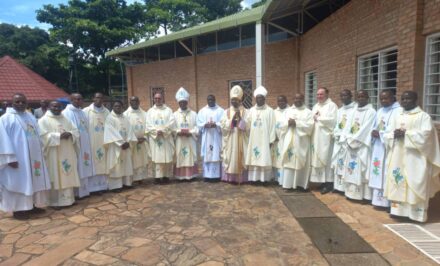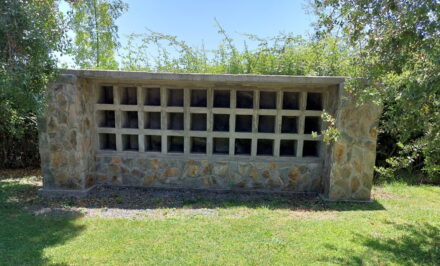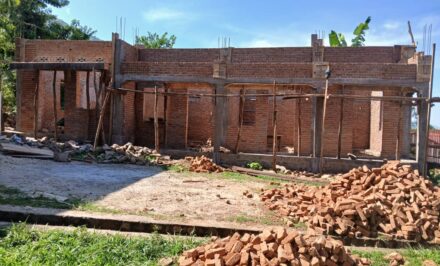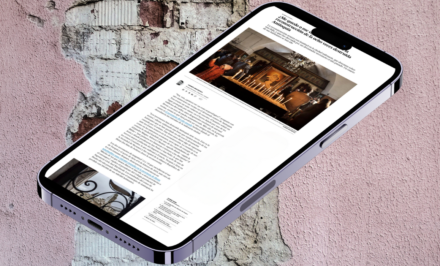
GERMANY, Sr. M. Charissa Frenzl/mda. “On 8 December we started a project in the Marienpfalz: German for refugees. A retired teacher from the neighbourhood gives the lessons and another neighbour looks after the people, helping them to make contacts … This happens in co-operation with the parish, and some other people have already applied to help, e.g., to visit two Albanian families. We feel that both the refugees – in the meantime from five countries – and those who offer to help them are enjoying it more and more, and that is precisely the mission of our shrine.” This was the comment of Sr M. Charissa Frenzl to an article that appeared before Christmas: ‘Almost a Christmas fairy tale: Refugees in the houses in Schoenstatt’. “We would be very happy if something in this direction were to happen in Schoenstatt. It would be – at least, that is how we understand it here – a fruit of the international jubilee”, she wrote. The editors of schoenstatt.org wanted to know more.
A few days later Sr M. Charissa Frenzl accepted the invitation and told us more about this project in the Schoenstatt Centre in Herxheim in the Palatinate. Her report follows:
Mrs Meyer lives close to the Schoenstatt Centre and comes to Holy Mass in the Shrine of Joy almost every day. During a meeting of the Parish Council we came into conversation and she told me that she would like to offer to teach refugees German. I spontaneously replied, “You can do it with us. We will make a room available to you. That is in the spirit of the Blessed Mother, who was also an asylum seeker after the flight into Egypt.”
We both talked others about the idea, among others the couple responsible for the Family League, and in this way the information passed via a doctor to Mr Dudenhoeffer. He also lives only a few houses away from our Centre.
Starting on 8 December
Shortly afterwards he visited the Centre and told us that he had been in a flat occupied by refugees. Among them were two Eritreans and two men from Somalia. He thought it a wonderful idea to teach them German, and he wanted to make contact with more people and bring them here. We never thought it would be possible to put the idea into practice still in 2014. As a result of his initiative it was possible to arrange a date for the first lesson within a week.
The Blessed Mother herself saw to a good start on 8 December. Since Mrs Meyer was ill, I jumped in for her. An elderly lady from Stuttgart, who had booked a room with us, and who wanted to visited relatives that weekend, was accompanied by a nurse who came from Eritrea and was able to translate for us. Mr Dudenhoeffer accompanied the four men and the first lesson started in the “Pfalzer Sonnenau” (Palatinate Sunny Meadow). With the help of the translator they quickly felt understood and she was a great help. The men wanted to know what we were planning and what we expected of them. We explained that we wanted to help them, and that it was important for us to trust one another. In the course of the conversation – after all, we had to get to know each other a bit – two of them told us about their children. We could feel that they had suffered greatly.
To be able to speak in my language
I invited Fr Elias to the next meeting. He is a Benedictine from the Dormitio Abbey in the Holy Land, and is staying at the moment in Herxheim. He told them that a few years previously he had learnt Arabic in Syria. So this was another bridge to the two from Somalia. A few years ago I had accompanied a pilgrimage of Eritrean families from the Liebfrauenhoehe, and knew an Eritream priest from that time. He quickly answered my email, and the one Christian man who wanted to speak with a priest was able to speak to his compatriot on the phone.
Another woman in the parish had also told Mr Dudenhoeffer that she would like to do something. She told me on the phone that she would visit the two Albanian families. I wanted to ask a Serbian on our staff if she knew of anyone who could speak their language. To my surprise I discovered that she spoke Albanian, so she went along as interpreter. The two families were very happy, and three new students – two women and a man – joined the group. Then more people from Africa joined the existing group. They came from the above-mentioned countries and Central Africa.
By 18 December Mrs Meyer already had eleven students.
Before Christmas a woman from Mauritius visited us. I had got to know her in Freiburg. She entered into the covenant of love this year. Among other languages she also speaks French, so was able to converse with the men from Central Africa; she practiced a little German with one of them and he told her about his worries and wishes.
A perspective for the future
I don’t know where the bicycles came from, but some broadly smiling students rode proudly into the courtyard shortly before Christmas. We could feel that in a very short time they had become happier and hoped that a perspective for the future had opened to them. These people are highly motivated and grateful, and that makes everyone happy who has helped with the project until now.
Translation from German by M. Cole, UK














